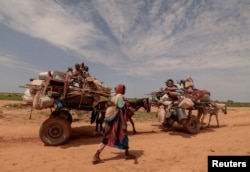A UN report finds that nearly 11 months of conflict in Sudan have resulted in mass killings, displacement, property destruction and rampant human rights violations, causing immeasurable harm and suffering to millions of people, while their plight is all but forgotten by others international.
“The crisis in Sudan is a tragedy that seems to have fallen into the fog of global amnesia,” UN High Commissioner for Human Rights Volker Turk told an interactive dialogue on the situation in Sudan at the UN Human Rights Council on Friday.
Turk offered a shocking and bleak assessment of life in Sudan since rival generals from the Sudanese Armed Forces and the paramilitary Rapid Support Forces plunged the country into “a brutal, senseless conflict” on April 15.
“They created a climate of pure terror that forced millions of people to flee,” he said. “They have consistently acted with impunity and there is a clear lack of accountability for the multiple offenses they committed.”
He said the report highlighted a range of serious violations and abuses committed by Sudan’s warring parties, noting that “many of these violations may amount to war crimes or other atrocity crimes.”
According to the United Nations, at least 14,600 people have been killed and 26,000 injured since the war began. The UN refugee agency reports that the war has displaced 8.1 million people from their homes, 6.3 million of whom are within Sudan and 1.8 million have become refugees in five neighboring countries, making Sudan the world’s largest displacement crisis.
Hanna Serwaa Tetteh, UN Special Envoy to the Horn of Africa, said: “Sudan is facing one of the worst humanitarian crises in the world today as a direct result of the armed conflict that began on 15 April. .” He added that “18 million people face severe hunger and 25 million are in need of humanitarian assistance.”
“The Sudanese people bear the brunt of the conflict at the heart of the military and security establishment, that between the Sudanese Armed Forces and the Rapid Support Forces,” she said.
High Commissioner Turk said the war in Sudan involves more than just fighter jets, drones, tanks and other heavy artillery.
“Sexual violence, including rape, as a weapon of war has been a clear and despicable feature of this crisis from the beginning,” he said, stressing that his office had documented 60 cases of conflict-related sexual violence The incidents involved at least 120 victims across the country, mainly women and girls.
“Unfortunately, these figures are far lower than reality. It was reported that 81% of recorded incidents were caused by men wearing MSF uniforms and armed personnel affiliated with Médecins Sans Frontières,” Turk said.
He expressed concern about the rise in racially motivated killings, the fate of thousands of civilians arbitrarily detained by both sides and their affiliates, and the recruitment of child soldiers.
“My office has recently received reports that Doctors Without Borders has recruited hundreds of children as fighters in Darfur and that the Sudanese Armed Forces has recruited hundreds of children in eastern Sudan,” he said.
He said he had received disturbing reports of civilians themselves mobilizing under the new popular armed resistance movement. “There are real concerns that this could lead to the formation of armed militias without clear control, thereby increasing the likelihood that Sudan will fall into a protracted civil war.”
These concerns were echoed by Special Envoy Tait, who said: “The most serious risk threatening Sudan is the de facto division between territories controlled by Médecins Sans Frontières and the Sudanese Armed Forces.
“The international community should avoid this risk of de facto fragmentation by supporting and promoting a Sudanese-owned and led process to address the root causes of the conflict,” she said, stressing that it was impossible for the two competing military forces to coexist.
Sudan’s justice minister was apparently annoyed that the UN report seemed to equate the actions of the Sudanese Armed Forces with those of the Rapid Support Forces.
Justice Minister Moawiya Osman Mohammed Khair Mohammed Ahmed said the Sudanese Armed Forces did not instigate the conflict but were responding to rebel attacks against a sovereign state.
“This was a conspiracy to catch the country’s military off guard,” he said. “This militia seeks to seize power by launching a full-scale armed attack on the state by looting and burning buildings.”
He accused Médecins Sans Frontières of committing numerous atrocities across the country, calling what they were doing in Darfur “unspeakable.”
Ahmed said his government had begun investigating alleged crimes committed by the rebels, “especially those related to genocide, war crimes, crimes against humanity and other crimes related to killings, rapes and looting”.
He called on the international community to help strengthen Sudan’s “serious legal processes to achieve justice and provide redress to victims through national and international mechanisms.”
High Commissioner Turk said the international community also had a key role to play in alleviating the suffering suffered by the Sudanese people.
“Sudan has endured decades of unrest and repression before this crisis, but the Sudanese people were not prepared for the suffering they face today,” he said.
“The warring parties must agree to restore peace immediately. The future of the Sudanese people depends on it.”
Follow us on Google news ,Twitter , and Join Whatsapp Group of thelocalreport.in
